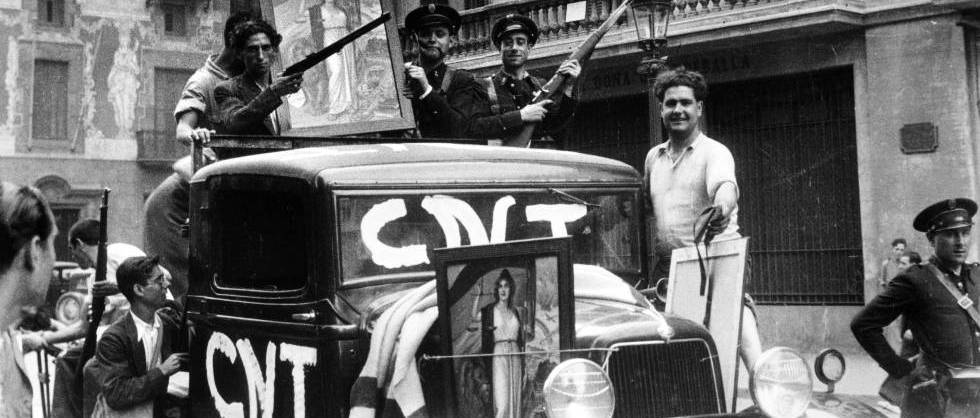Barcelona: A Revolution Betrayed
Posted on 10th August 2021
Once a great Imperial power Spain had endured a long and seemingly irreversible decline isolated much like the peninsular upon which she lay from the rest of Europe. In some places deeply conservative in others a hotbed of revolution, a place where great wealth sat in mutual antipathy alongside grinding poverty, devoutly Catholic yet violently anti-clerical, wedded to tradition but prone to extremes. It was also sharply divided along regional lines with powerful separatist movements in Galicia, the Basque Country and Catalonia. So much so that by the 1930’s Spain as a sovereign entity seemed close to falling apart its politics no longer those of compromise but of bitter and irreconcilable hatreds.
A thin veneer of unity was provided by a deeply unpopular Monarchy only kept in place since 1923 by the relatively benign dictatorship of General Primo de Rivera. Following the fall of his Government in 1930 the Royalist Party was resoundingly defeated in municipal elections and King Alfonso XIII forced to abdicate. On 10 May 1931, the Second Republic was formed and all of the political divisions that had been suppressed under Primo de Rivera’s dictatorship would burst to the surface.
Spain was the only country in Europe where Anarchism had taken a firm hold but even here it was not a national phenomenon but restricted to certain regions. It was at its most virulent in the city of Barcelona and the industrial heartland of Catalonia but also in the barren wastes of Andalucia and Extremadura where its adherents displayed a quasi-religious almost messianic devotion that saw the shedding of blood as the only means by which to purge Spain of the poison of oppression, poverty and inequality.
In an attempt to provide direction for the rapidly expanding but by its very nature poorly organised movement in 1910 the Confederacion Nacional Del Trabajo, or C.N.T was formed. It was in effect a Trade Union and though it did not keep any formal membership list by the mid 1930’s it was believed to number around 500,000; while the Federacion Anarquista Iberica, or F.A.I, founded in Valencia in 1927, though formally independent of the C.N.T was in effect its militant wing.
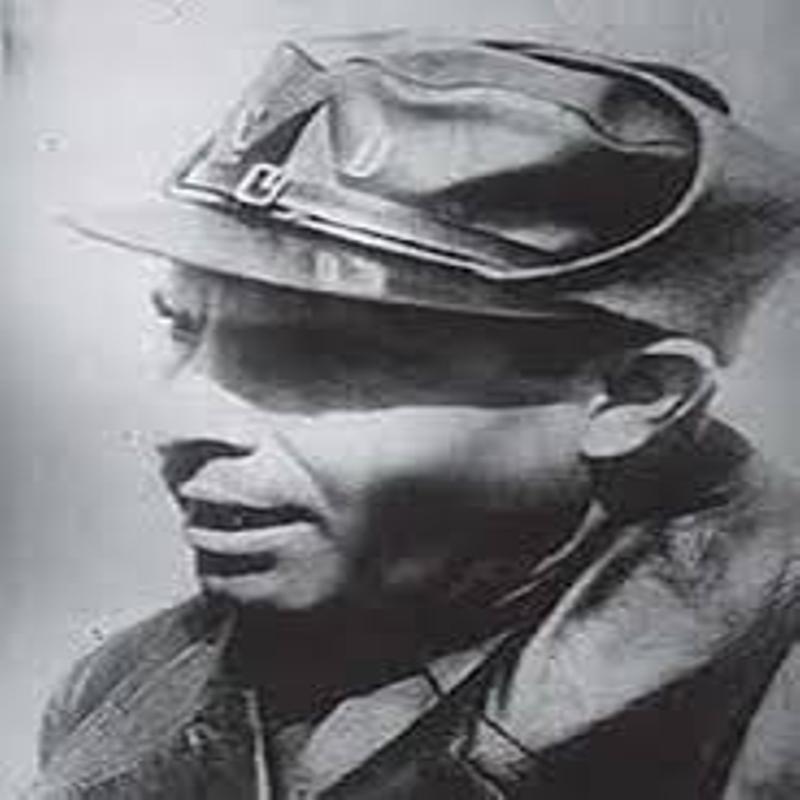
The F.A.I which would publicly deny its own existence was dominated by men of violence such as Buenventura Durruti, Francisco Ascaso and Juan Garcia Oliver who were responsible for such criminal activities as bank robberies, factory bombings, drive-by shootings and political assassinations. Estimated to never have numbered more than 30,000 even at its peak it was to form the backbone of the Anarchist Militias that opposed the Nationalist forces in the opening months of the Civil War.
Hopelessly split between Left and Right in 1934, the mining region of the Asturias erupted into outright rebellion and the army under the little-known General Francisco Franco was sent to crush the revolt which he did with much brutality.
As the decade progressed the split between the contending parties merely widened to the point where the opposing sides seemed to be representing two different countries and so it was hardly surprising that two political blocks one from the Left the other from the Right were formed to contest the forthcoming election: The Left leaning Popular Front was a coalition of Socialists, Communists, Liberals and Republicans while the Right Leaning National Front was composed of Conservatives, Fascists, Catholics and Monarchists. The Anarchists chose to abstain though they tacitly supported the Popular Front.
Spain simmered like a tinderbox as the people went to the polls on 16 February 1936, and the result was very close indeed. The Popular Front polled 4,654,116 votes or 47.03% of the vote to 4,503,505 or 46.48% for the National Front.
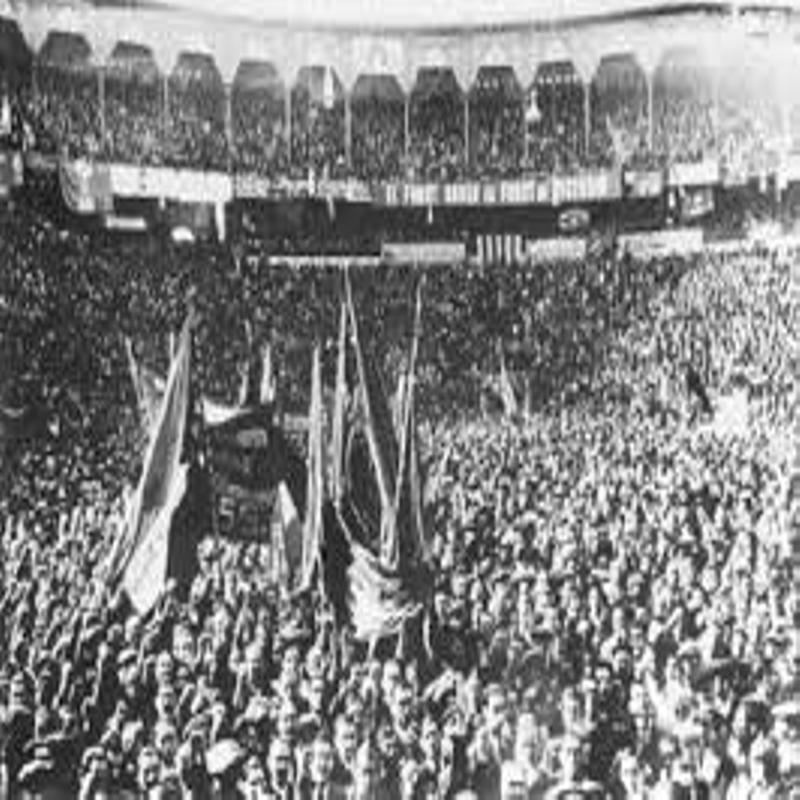
Despite the narrowness of the victory the result was enough to give the Popular Front an overall majority in the Cortes.
To placate its own supporters but further outrage its opponents one of the first measures the new Popular Front Government took was to release from jail left-wing political prisoners. It then implemented a programme of agricultural reform for the redistribution of land and proceeded to ratchet up its anti-clericalism. The wealthy responded by taking their money out of the country sparking an economic crisis.
Having failed to find salvation through the ballot box many on the Right looked to the Army to save them from what they perceived to be a Government of atheists, thieves and men of violence little better than a criminal enterprise. Even worse, the new Government seemed incapable of maintaining law and order and in the months immediately following the election there were as many as 113 strikes, 160 religious buildings attacked and burned, 1,500 people killed or seriously injured in political clashes, and 330 political assassinations..
Barcelona, the capital of Catalonia, had been the cradle of political discontent and revolution long before the outbreak of the Civil War.
By far the wealthiest region of Spain with its heavy industry and lush agricultural land its strongly independent people had long resented domination from Madrid, but It had recently won a degree of autonomy and had its own Government, the Generalitat, and this hard won independence it was determined to maintain.
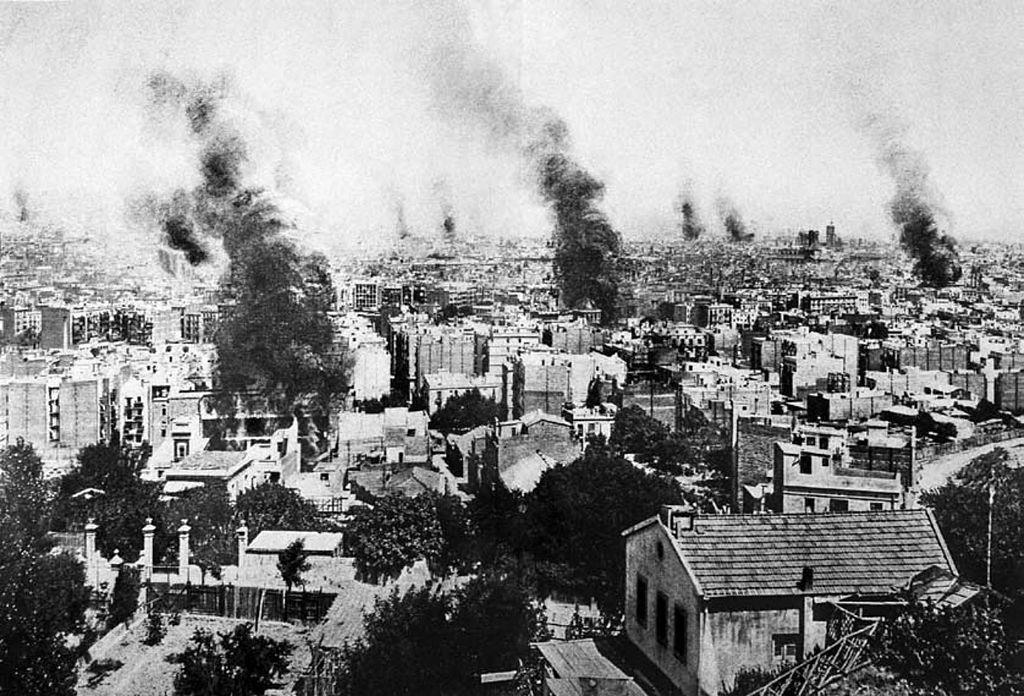
As long ago as July, 1909, in what became known as La Semana Tragica or the Tragic Week, the people of Barcelona had taken to the streets of the city to battle with police over the Government’s policy of conscripting young Catalans to fight in the Moroccan War.
By the time the riots were suppressed later 125 people had been killed, many more injured and thousands arrested. Though most of the arrested were later released the Government took the opportunity to rid themselves of a number of those they considered dangerous militants. One of these was the famous anarchist educationalist Francisco Ferrer, who was publicly garrotted, even though he had not even been in the city at the time of the riots.
Following the brutal suppression of La Tragica Semana revolutionary sentiment in Barcelona only increased and tit-for-tat killings became commonplace. Prominent businessmen, factory managers, and Government officials were murdered as also were trade unionists and leading militants as the police responded to the violence in kind.
When on 19 July 1936, General Manuel Goded flew into Barcelona to take control of the troops there and secure it for the Nationalist cause no city was better prepared to resist.
Unlike in most other cities the local Police and Civil Guard remained loyal to the Popular Front Government and rather than support the rebels handed over weapons to the workers. The fighting was fierce but greatly outnumbered the garrison in Barcelona was soon forced off the streets and made to take refuge in their barracks.
On 11 August, General Goded was captured and broadcast to his troops calling upon them to surrender. The following day he was taken into the courtyard of Montjuich Castle and shot dead. Many of the troops holed up in the Atarazanas Barracks believing this would also be their fate now refused to surrender.
Buenventura Durruti demanded that the Anarchists of the F.A.I be given the honour of storming the barracks. To them it was a matter of honour, pride and vengeance. They had to prove to their enemies that they were the more courageous. He got his way and led a quite unnecessary assault upon the barracks that was to cost the lives of hundreds of his men including that of his friend, Francisco Ascaso. But the barracks were stormed and those inside not killed in the fighting were led away and executed as they feared they would be.

The workers of Barcelona had liberated their own city from fascist oppression and a revolutionary fervour now took over. Patrols were organised to maintain order on the streets as the workers took over the running of their own factories, public amenities were also collectivised and militias hastily formed and rushed to the front to defend Catalonia from invasion. It was a time of great joy and hope, and the atmosphere was intoxicating.
The Anarchists were in charge, or were they? When Juan Companys, the President of the Generalitat, met the Anarchist leaders to inform them that he intended to resign and was handing over to them the levers of power, they demurred. They were after all Anarchists, devoted to the destruction of government and the dismantling of the structures of power. They may well be in de facto charge, but they could not take formal control. So, they declined his offer and Companys remained as President, but by doing so they had effectively ceded the power they had just bloodily won. It was a decision that was to come back to haunt them.
The journalist and author George Orwell, arriving in Barcelona in January 1937, long after the initial excitement at revolution had passed was still seduced by the atmosphere in the city. He wrote:
““To anyone who had been there since the beginning it probably seemed that even in January the revolutionary period was ending; but when one came straight from England the aspect of Barcelona was something startling and overwhelming. It was a town where the working class were in the saddle. Practically every building was draped in the red and black flag of the anarchists; every wall was scrawled with the hammer and sickle and the initials of the revolutionary parties; every church had been gutted and its images burnt, every shop and cafe had an inscription to say it had been collectivised; even the bootblacks had been collectivised and their boxes painted red and black. There were no private motor cars, all had been commandeered, all the trams and taxis were painted red and black. It was a place where the wealthy had ceased to exist. There were no well-dressed people at all. Everyone wore rough working class clothes, blue overalls or some variant of militia uniform. There was much in this that I did not understand, in some ways I did not like it, but I recognised it immediately as something worth fighting for. There was no unemployment and the cost of living was extremely low. There was a belief in the revolution and in the future, a feeling of having emerged into an era of equality and freedom. Human beings were trying to behave as human beings and not as cogs in the capitalist machine.”

Despite the revolutionary fervour and the overwhelming sense of optimism described by Orwell, political tensions were mounting. The Republican Government was desperate to wrest control of Catalonia, a region essential to its survival away from the Anarchists and they were goaded on to do so by the increasingly influential Communist Party who wanted those they saw as counter-revolutionary enemies destroyed.
For the time being the Anarchists were still too powerful and their continued support was needed in the struggle to resist the fascist advance, so they continued to work together but everyone knew it was only a matter of time.
On 3 May 1937, Rodriguez Salas, the Chief of Police and a Communist ordered the Civil Guard to occupy the Telephone Exchange. This was the centre of communications in the city and the city’s link to the surrounding countryside and the Northern Front. Whoever controlled the Telephone Exchange controlled Barcelona, and since July 1936, it had been in the hands of the Anarchist C.N.T.
The building was surrounded and those inside ordered to vacate the premises but the anarchist guards who were armed refused to do so. A little later firing broke out and the rumour soon spread that Government forces were trying to take back the city. By the following morning barricades had been erected throughout the city and fighting was widespread with squads roaming the streets looking for people of opposing political parties to murder.
The anarchists on the ground believed that this was nothing less than a Communist coup and they were determined to resist it. Their leaders hesitated, however. The Anarchist Ministers Federica Montseny and Juan Garcia Oliver, who had denied their own political logic by joining the Government, arrived in the city to try and negotiate a settlement. They were at first ignored but still something had to be done. The Republic was turning on itself and it could not fight two wars at the same time.
The Socialist Prime Minister Francisco Largo Caballero was reluctantly persuaded to send 6,000 Assault Guards from Valencia to restore order. They were not welcome; barricades were erected throughout the city and a week of bitter street fighting followed during which more than 500 people were to be killed. But this was just the beginning as a Communist inspired purge now took place forcing many anarchists into hiding.
The main targets of their wrath were not the anarchist however but members of the Trotsyite, Partido Obrero Unificacion Marxista, or P.O.U.M and it was their leaders were hunted down and murdered. One of those forced to flee for his life was George Orwell who had been serving in the P.O.U.M Militia.
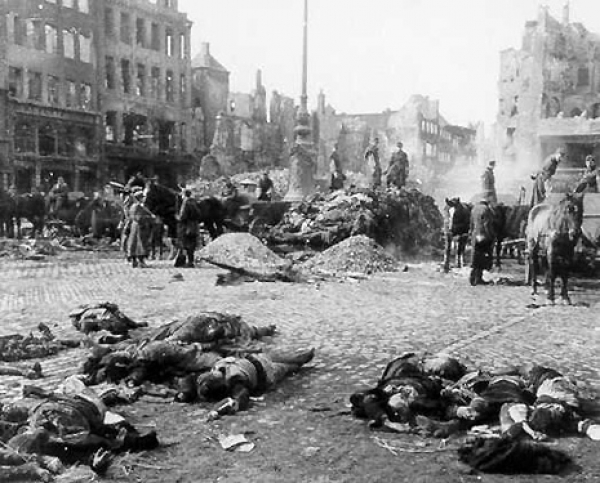
The May Days fighting had seen the anarchists defeated in their heartland and their Militias were now forcibly incorporated into the Republican Army. In protest at this Federica Montseny and Juan Garcia Oliver resigned from the Government but it was too late, their power had been broken and would never be restored.
On 17 May, Largo Caballero was forced to resign as Prime Minister to be replaced by the Communist sympathising, Juan Negrin.
Anarchism had been destroyed in Barcelona because by refusing to take formal power when they had the opportunity to do so they had sown the seeds of their own destruction. But with their defeat also died the revolutionary fervour that had seen men and women take up arms to fight for a cause they believed in.
When on 26 January 1939, the forces of General Franco entered Barcelona, the hotbed of revolution and the beating heart of the resistance to fascism in Spain they did so without a shot being fired.
In March, 1939, the events of May 1937 would be replayed once again but this time on the streets of Madrid. On this occasion the Anarchists were to be triumphant but unable to negotiate a settlement with Franco they were forced surrender the city.
Less than a week later he declared the Civil War to be over, its last bitter conflict having been between Anarchists and Communists those supposed allies in the fight against fascism.
Share this post:





